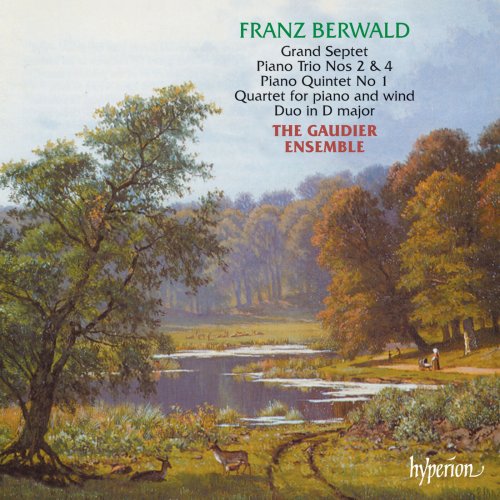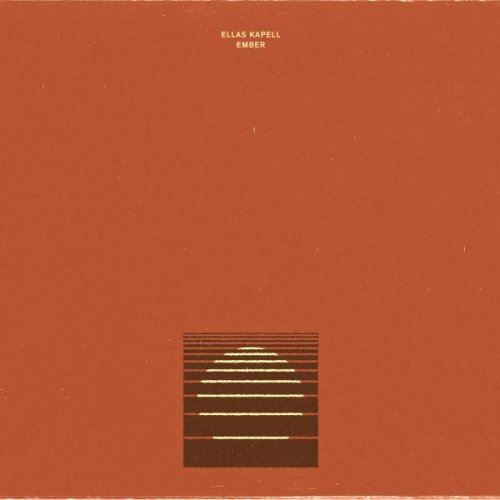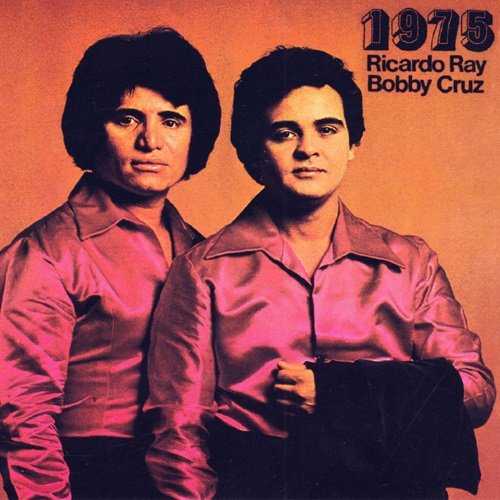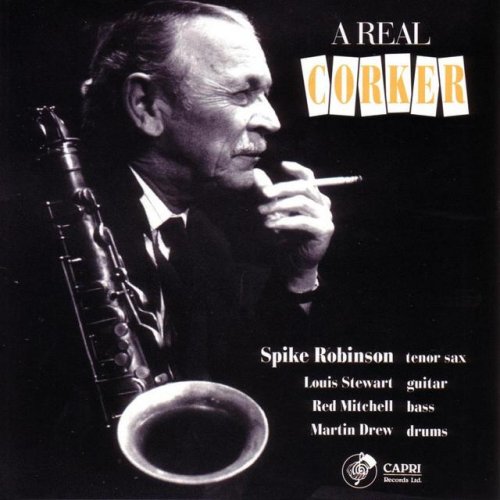The Gaudier Ensemble, Susan Tomes - Berwald: Chamber Music (2006)

Artist: The Gaudier Ensemble, Susan Tomes
Title: Berwald: Chamber Music
Year Of Release: 2006
Label: Hyperion
Genre: Classical
Quality: flac lossless (tracks) +Booklet
Total Time: 02:06:32
Total Size: 434 mb
WebSite: Album Preview
TracklistTitle: Berwald: Chamber Music
Year Of Release: 2006
Label: Hyperion
Genre: Classical
Quality: flac lossless (tracks) +Booklet
Total Time: 02:06:32
Total Size: 434 mb
WebSite: Album Preview
CD1
01. Quartet for Piano and Wind in E-Flat Major, Op. 1: I. Adagio – Allegro ma non troppo
02. Quartet for Piano and Wind in E-Flat Major, Op. 1: II. Adagio
03. Quartet for Piano and Wind in E-Flat Major, Op. 1: III. Finale. Allegro
04. Piano Trio No. 2 in F Minor: I. Allegro molto
05. Piano Trio No. 2 in F Minor: II. Larghetto
06. Piano Trio No. 2 in F Minor: IIIa. Scherzo. Molto allegro
07. Piano Trio No. 2 in F Minor: IIIb. Allegro molto
08. Grand Septet in B-Flat Major: I. Adagio – Allegro molto
09. Grand Septet in B-Flat Major: II. Poco adagio
10. Grand Septet in B-Flat Major: III. Finale. Allegro con spirito
CD2
01. Piano Quintet No. 1 in C Minor: I. Allegro molto
02. Piano Quintet No. 1 in C Minor: II. Adagio quasi andante
03. Piano Quintet No. 1 in C Minor: III. Allegro assai e con spirito
04. Duo for Violin and Piano in D Major: I. Allegro
05. Duo for Violin and Piano in D Major: II. Romance. Andante
06. Duo for Violin and Piano in D Major: III. Allegro giocoso
07. Piano Trio No. 4 in C Major: I. Allegro
08. Piano Trio No. 4 in C Major: II. Adagio
09. Piano Trio No. 4 in C Major: III. Finale. Quasi presto
Franz Berwald’s reputation rests largely on the four symphonies that he composed in the first half of the 1840s, and more particularly on the highly original and aptly named Sinfonie singulière. The chamber music, with the possible exception of the Grand Septet of 1828, maintains a more peripheral hold on the repertory and is rarely encountered in the concert hall outside the composer’s native Sweden.
Berwald did not really come into his own until the present century, one of his earliest champions being Wilhelm Stenhammar. But why, it may be asked, did his music make so little headway either in Sweden or, for that matter, anywhere else, and why was he cold-shouldered by the Swedish musical establishment of his day? First, he left Stockholm at important periods of his career and so was not on hand to press the claims of his music; secondly, in his dealings with others Berwald was far from being his own best friend (Mendelssohn met him in Berlin early in the 1830s and found him arrogant, and no doubt his demeanour played a part in ensuring his neglect); and thirdly, the few works of his that were played in Sweden in the 1840s were largely uncharacteristic and many of the performances poorly prepared. Stockholm heard two operettas, Modehandlerskan (‘The modiste’) and Jag går i kloster (‘I enter a convent’), and a couple of cantatas during the 1840s, and the picture derived from these works is very different to the one posterity has formed from the four symphonies of the composer’s maturity. Berwald himself heard only one of these, the Sinfonie sérieuse, although he had, of course, seen performed the early A major symphony of 1821 (which survives in fragmentary form and is now recorded on Hyperion CDD22043).
In any event there was no really first-class symphony orchestra in Stockholm at the time: indeed there was no permanent orchestra at all apart from the Royal Opera Orchestra (‘Det kgl. Hovkapellet’) in which the young Berwald had himself played at various times in the 1810s and ’20s. No effort was made to present symphony concerts on any regular basis until the 1870s. It is, therefore, hardly surprising that Berwald tried so hard to make his way as a composer of operas; in all he composed (or planned) more than eleven, though of the two best known Estrella de Soria was not mounted until 1862 and Drottningen av Golconda (‘The Queen of Golconda’) was not performed in Stockholm until 1968 on the centenary of his death. Even the Piano Quintet No 1 of 1853, included in this set, was not given in public until 1895. This was the work that Berwald had taken to show Liszt on his visit to Weimar in 1857 and which the great composer had sight-read, making an indelible impression on the Swedish master: ‘I once heard my C minor quintet played by a marvellous and truly poetic pianist—sight-reading!—that really was music. Suddenly it was not just a piano—it was like a full orchestra!’ Indeed such was the impact this encounter with Liszt made on the composer that he dedicated the work’s successor, the A major quintet to him. Liszt’s reply proved only too prophetic: ‘Vous êtes vraiment original, mais vous n’aurez pas de succès de votre vivant. Et pourtant il vous faut continuer dans cette voie.’
Although Berwald was born in Stockholm the family were of German stock, and the name has been traced back to Bärwalde in Der Neumarck, south of Stettin. Born in 1796, a year before Schubert, he died the same year as Rossini and a year before Berlioz. As a sixteen-year old, Franz joined his father in the Royal Swedish Opera. He had already shown considerable creative prowess as well as a many-faceted and resourceful intelligence. By 1818 it had become obvious to him that he should try his fortune as what we would today call a ‘free-lance’ composer and performer. He undertook a tour with his violinist brother Christian to Helsinki and St Petersburg, and began publishing a Journal de musique to further disseminate his music.
As with so many nineteenth-century composers, circumstances forced Berwald to pursue a dual career, spending many years on non-musical projects. When he moved to Berlin in his thirties and made little headway in the musical world, he founded an orthopaedic institute, based on the most highly developed techniques and largely following the principles of Ling. Some of the apparatus that he himself devised for the treatment of patients was in all essentials still in use as a basis for therapy well into the 1900s—all the more remarkable since Berwald had no scientific training and, indeed, precious little formal education of any kind. In the 1840s he returned to Sweden but again failed to make headway in the musical world. By the 1850s he had given up hope of advancement in the Swedish musical establishment, having been passed over for two posts to which he felt his talents entitled him—conductor of the Opera Orchestra and Director of Music at Uppsala University. Berwald turned to another non-musical activity, moving to the north of Sweden each summer as manager of a saw mill and a glass works. He even briefly ran a tile-and-brick factory, and his pen was in constant use as a polemicist on a wide variety of social issues, showing a progressive vision and sympathy.
![Antonio Faraò & Stéphane Belmondo - Do it! (2026) [Hi-Res] Antonio Faraò & Stéphane Belmondo - Do it! (2026) [Hi-Res]](https://www.dibpic.com/uploads/posts/2026-02/1772037177_1.jpg)







![Lexington - HARD BOP TANGO (2026) [Hi-Res] Lexington - HARD BOP TANGO (2026) [Hi-Res]](https://www.dibpic.com/uploads/posts/2026-02/1772180664_cover.jpg)